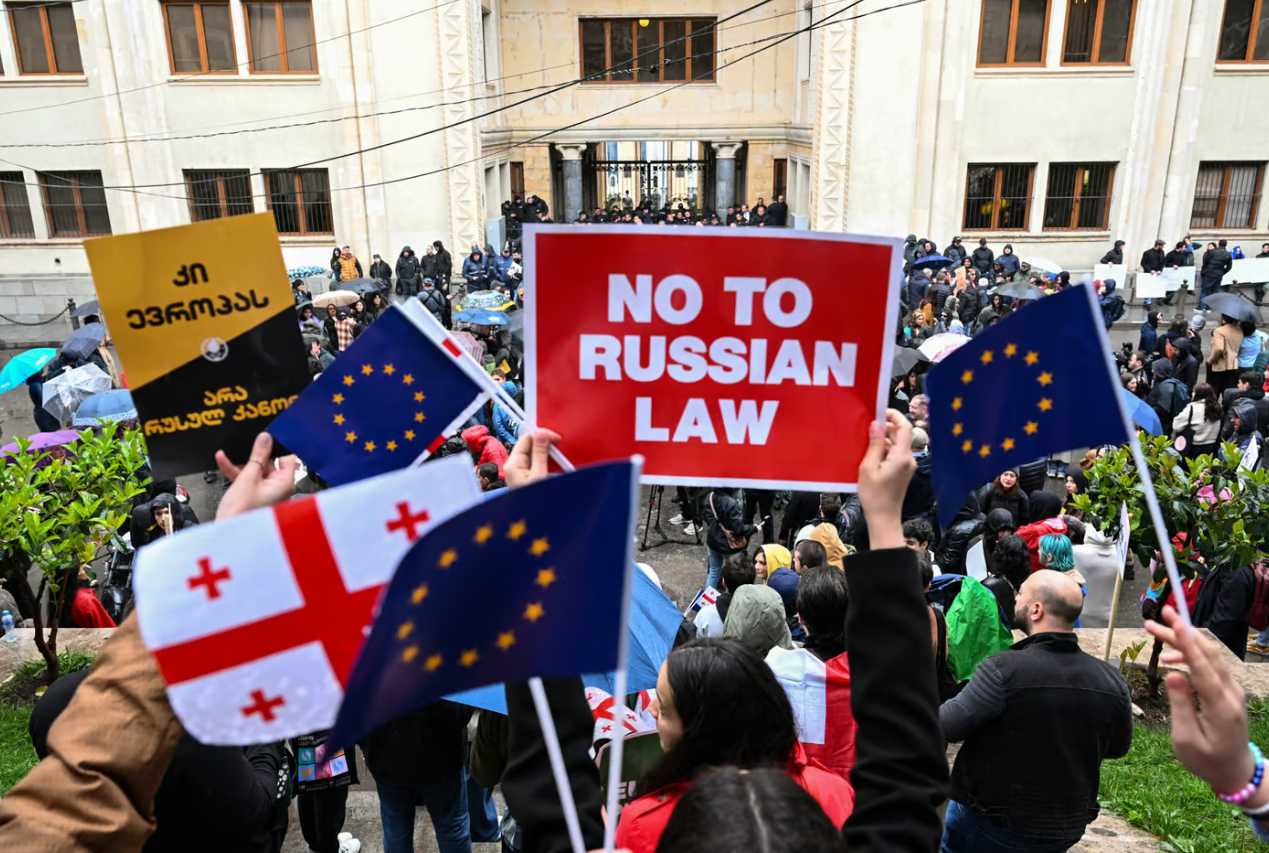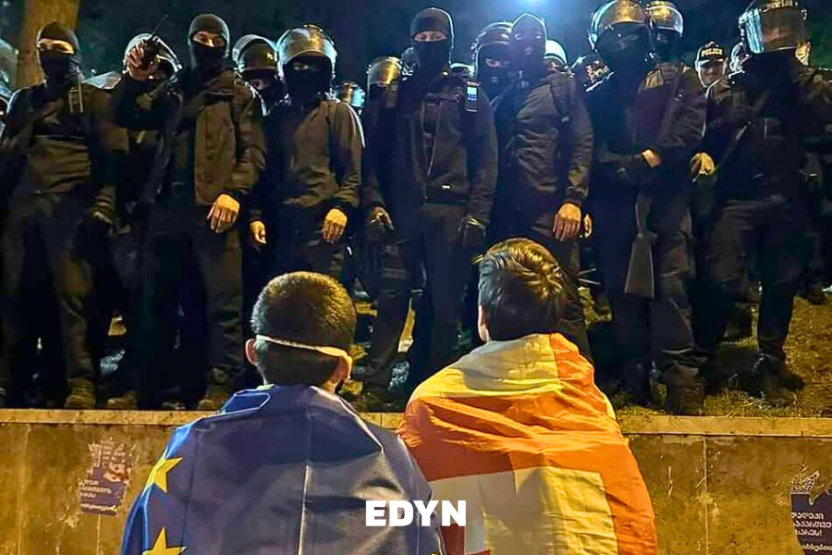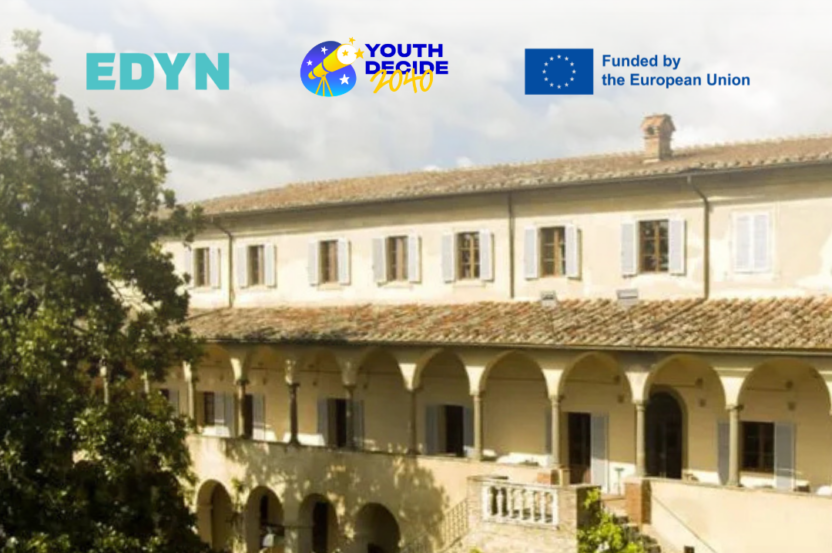EDYN Features are short articles where our members share their thoughts on key issues like youth engagement, disinformation, democracy, EU enlargement, and conflict resolution. The goal is to spark conversations, highlight different perspectives, and to help us all think more deeply about what’s happening in the world.
Want to be a part of the series? Write a message to [email protected] and share your ideas!
The “Foreign Agent Law” & Parliamentary Elections: Georgia’s European Future and Regional Security in danger?
 |
Written by Dr. Giorgi AgirbaiaMember of EDYN Georgia
|
Introduction
On August 1, 2024, Georgia’s controversial “Transparency of Foreign Influence” Law came into force, giving one month to the NGOs and media organizations receiving over 20% of their funding from abroad, from international organizations to register as “organisations serving the interests of a foreign power”, as announced by the Ministry of Justice. An organization that does not comply with this law will be fined 25,000 GEL the first time, and these fines will increase each time. According to several national statistics, media sources only 2% of NGOs registered on this complicated system, which has an issue of transparency too. The legislation is regarded as a modeled of a law introduced in Russia in 2012, that was used as a tool for repressing “Watchdog” NGOs and those organizations, individuals criticizing government, investigating various corruption cases and human rights violation. Additionally, organizations that sympathized with Western countries. Practically, in a short time this caused elimination of Critical CSOs and silenced critical media organizations in Russia. The law adopted by Georgian Gov. is even targeting individuals as well.
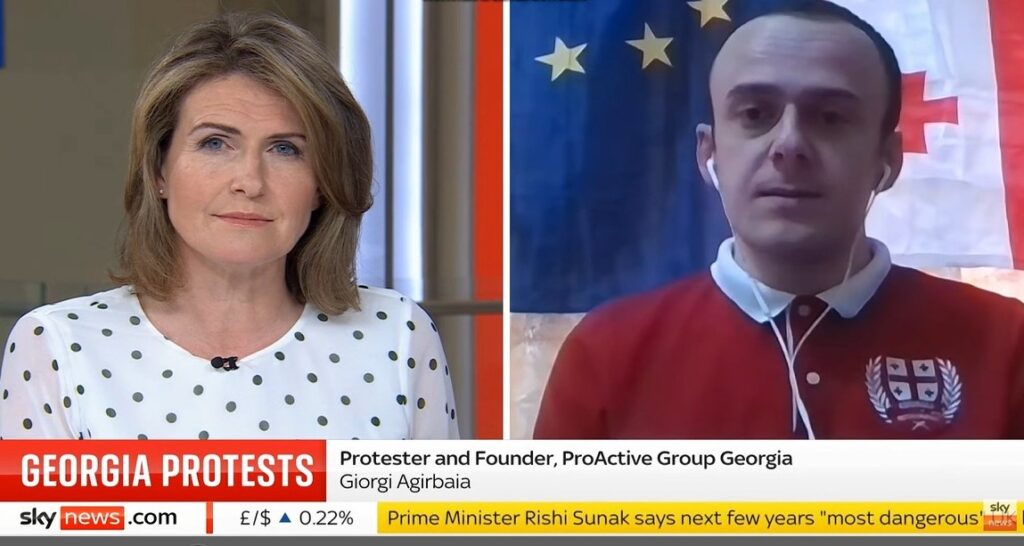
Background Information
Georgia’s path toward European Union (EU) and NATO integration has been a cornerstone of identity after the collapse of the Soviet Union and regaining independence in 1991. However, the Foreign Influence Agent Law represents a stark deviation from this trajectory. The law’s re-introduction in April 2024, despite of the promises, that it won’t be re-introduced after its initial rejection in March 2023 due to massive protests during 7-9 March, underscores the Georgian government’s shifting stance and rising domestic challenges. This was a two-month period of the largest demonstrations in recent Georgian history. Over 200,000 people rallied for Georgia’s European Future. You can find more about it in my SkyNEWS Interview. As EDYN, we made a Statement on the law, too. During these times, Special forces heavily dispersed the demonstrations several times in front of parliament, arrested dozens of protesters, civic activists and politicians were heavily beaten.
Join me in a discussion where I share some arguments and viewpoints on what this law means for Georgians, effect on Georgia’s Euro-Atlantic Integration and for eastern neighborhood regional security.

14the May, 2024, thousands of people gathered In front of parliament, together with my friends, colleagues we have watched in live how 84 MPs voted in favor of “Foreign Agent Law” and adopted. Democracy was crying in front of Parliament, democracy and Georgia’s European Future defenders. Darkest day for Georgia’s democracy. Euro-Atlantic Integration never been questioned before. All the major strategic partners and supporters of Georgia: EU, NATO, US and international civil society unanimously agreed that, this law is a step in the wrong direction and takes Georgia further away from its Euro-Atlantic integration.
Let me share several common arguments from both side and debate on it. The Georgian government claims the “Foreign Agent Law” protects national security by ensuring transparency in foreign funding, similar to laws in the US and Australia. However, unlike those countries, this law targets CSOs and national media in Georgia, limiting their freedom and aiming to silence criticism of corruption, democracy backsliding and decrease Gov. monitoring mechanisms. The law equates Georgia’s strategic partners, like the EU and US, who have invested billions in rebuilding and reforming the country healthcare, education, public administration sectors to turn into European Democratic State, with the Russian Federation, which occupies 20% of Georgia’s internationally recognized territory, killed thousands of Georgians and has brought nothing good for Georgia and its people.
The so called: “Georgian Dream” (Russian Dream Influenced Power) Party faces growing domestic opposition and criticism. They are already 12 years in power and as Prime Minister announced recently, they are planning to stay at least 12 more years. This law also affects rural youth NGOs and centers, which provides various services for marginalized groups, people with fewer opportunities, IDPs, refugees, people with disabilities, people who faces domestic violence, etc. As the majority of the services, programs to support those groups funded by the US & European donors, international organizations.
From the other side, by labeling NGOs and media as foreign agents, it repress critical voices that expose corruption, nepotism, and democratic backsliding. This undermines the very institutions that uphold democratic accountability and transparency, driving Georgia away from its EU and NATO aspirations, as widely mentioned by NATO’s Secretary General, EU High representatives, US and other allies.
Despite its aspirations for Euro-Atlantic integration and becoming an EU candidate, Georgia’s government actions contradict this goal. The law reflects a shift away from Western alignment, condemned by international partners. The government is trying to balance EU/NATO membership ambitions with appeasing pro-Russian elements and strengthening ties with China and Iran too. While the Armenia advancing in its EU integration, Georgia’s new multi-vector international policy creates a geopolitical vacuum that Russia is keen to exploit, thereby undermining regional security.
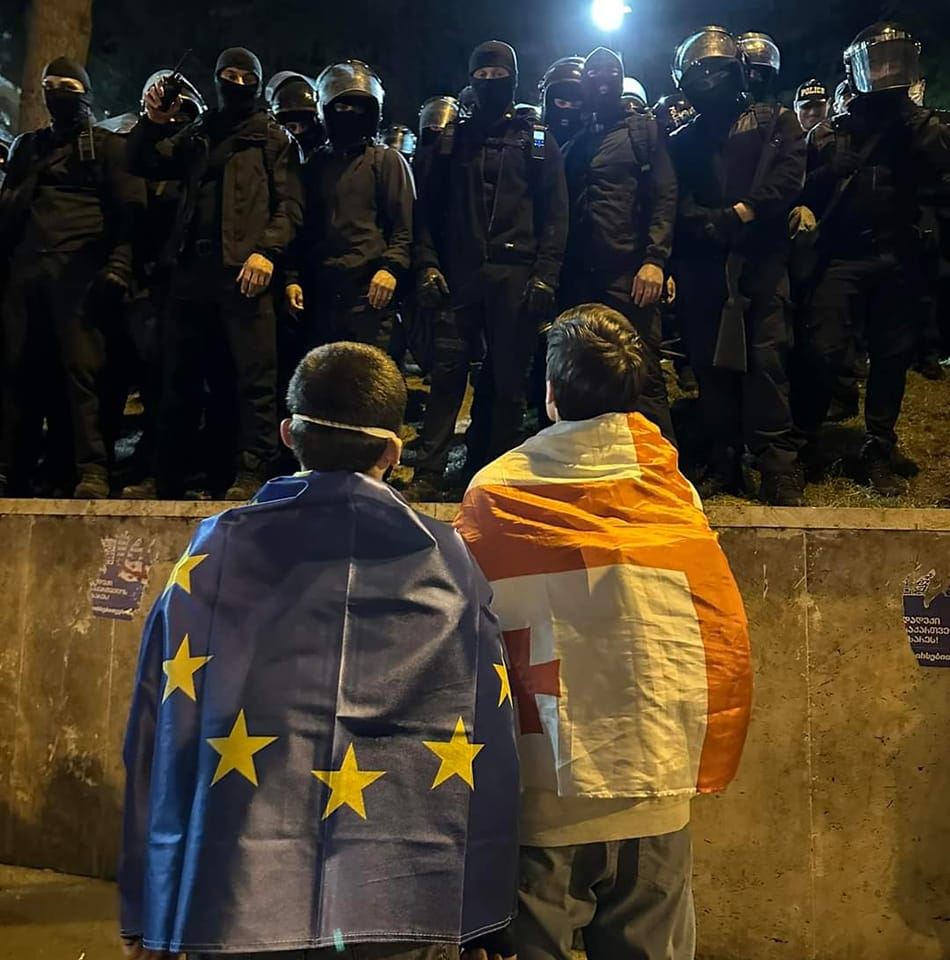
The law’s implementation has immediate economic repercussions. The EU has frozen €30 million allocated for Georgia’s defense sector, and the US has suspended over $95 million in aid. These financial penalties harm Georgia’s economy and weaken its defense capabilities, making it more vulnerable to external threats. In June, European Council agreed to pause direct financial support to the Government of Georgia. The government was one of the biggest recipients of foreign funds in Georgia. ( EU published the statistics: 11 times more EU funding allocated to Ministries (517 Million EUR), than Civil Society Organisations (46 Million EUR) between 2019 and 2024. More than 2/3 of the €46.1 million of EU funds allocated to CSOs goes to organisations providing direct services and support to people in Georgia. EU leaders made the decision to halt the process and freeze direct financing of Georgian authorities during the last summit of the European Council. The process of revision of relations between Georgia and United States is ongoing.
On June 6 and September 16, 2024, the US State Department announced visa and financial sanctions against Georgian Dream representatives and satellite group leaders, parliamentarians, law enforcement officers, and private individuals responsible for undermining democracy in Georgia, attacking peaceful demonstrators, intimidating civil society, and spreading disinformation. U.S. Congressman Joe Wilson introduced the “MEGOBARI Act” in May, chairman of the U.S. Congress Helsinki Committee, calling for sanctions against officials undermining Georgia’s democracy and emphasizing its importance before the October elections. This act differs from the bipartisan “Georgian People Act“, which also focuses on sanctions but reaffirms the US commitment to the people of Georgia, civil society, and democracy, initiated by Senators Shaheen, Risch, Cardin, and Ricketts.
In summary, The Foreign Influence Agent Law is a significant backsliding for Georgia’s democratic aspirations and its path toward European integration. By equating Western strategic partners, donors with “foreign powers serving hostile interests”, the law undermines decades of progress supported by international investments in education, healthcare, and public administration. This is alarming and needs urgent reactions and fast solutions, mechanisms to ensure Georgia stays on European track as a reliable partner in the Eastern neighborhood, Georgia historically given special role and interest in regional Geo-politics due to its location, considered as a bridge between Europe – Asia.
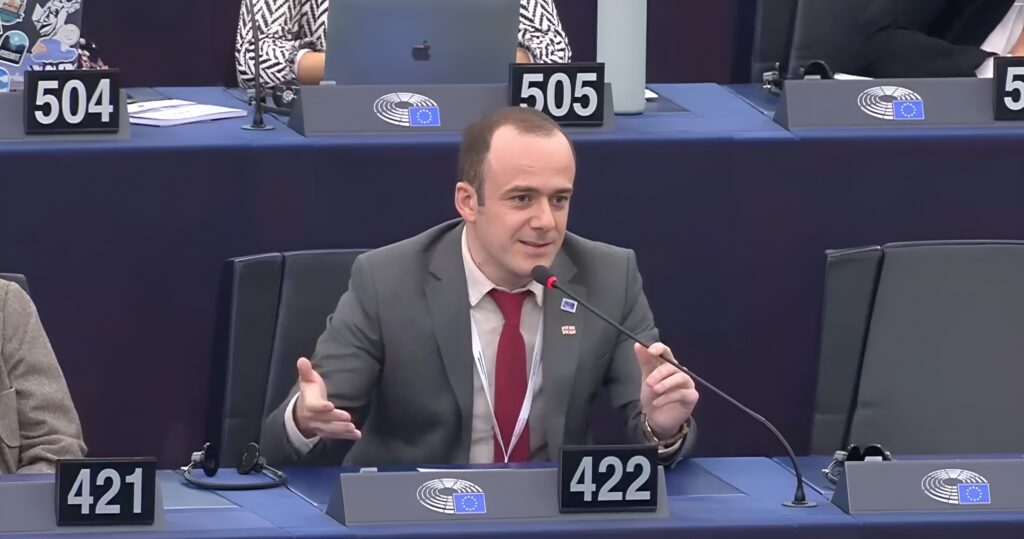
The Constitutional Court reviewed the appeals from the President, CSOs, and pro-European opposition parties. It is a critical step in challenging the law’s constitutionality before election and before Gov. activates repression tool. However, after a month of court debates and discussions, the Constitutional Court is delaying the announcement of the result. Georgian Constitution Article 78: “The constitutional bodies shall take all available measures within their competence to ensure Georgia’s full integration into the European Union and the North-Atlantic Treaty Organization;” This path supported by over the 83% majority of Georgians. (NDI & IRI recent polls).
26th October Parliamentary elections in Georgia is the pivotal for Georgia’s democracy, as well as the region’s European future and security. The international community must use all the legal possible mechanisms, including large-scale observation missions to support elections process in Georgia held with the respect of fundamental principle of democracy, free and fair elections. Stand with Georgian people, CSO, media who are now at frontlines of defending democracy to ensure free and fair parliamentary elections, where people can freely decide to continue living with “Russian style laws” or to give a chance “Pro-European coalition”. According to the recent Edison Research polls announced 4th Oct, 71% of Georgian’s think that Government should be changed and to give chance new political groups. Meanwhile, Georgia’s election administration opens only 60-election precinct in 42 country. Government and Russian “Trojan Horses” party uses very negative, shameful war vs peace campaign, billboards. However, CSO’s large-scale election coalition missions are more united and as never before and trying our best to ensure free and fair elections and citizens higher turnout, despite several repressive mechanisms, obstacles used against CSO’s, Media and citizens.
As Roberta Metsola, European Parliament President said: Tbilisi, we hear you! We see you! Georgians on the streets are dreaming of Europe. Proudly waving the European flag. They want a European future. They expect European values and standards. The European Parliament stands with the people of Georgia.” – It is time for Actions!
In conclusion, the Foreign Influence Agent Law threatens to derail Georgia’s European integration and influence regional security in Eastern Europe. Immediate and concerted efforts are needed to repeal this law and restore Georgia’s democratic trajectory, reflecting the will of its people and honoring its constitutional commitments. Together, we can safeguard democracy, Georgia’s European future, and regional security.
